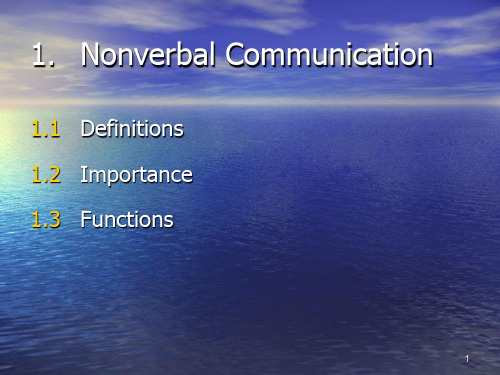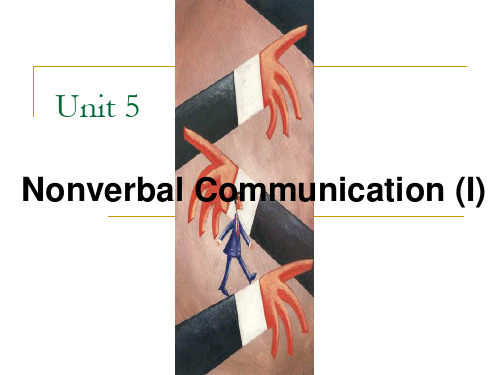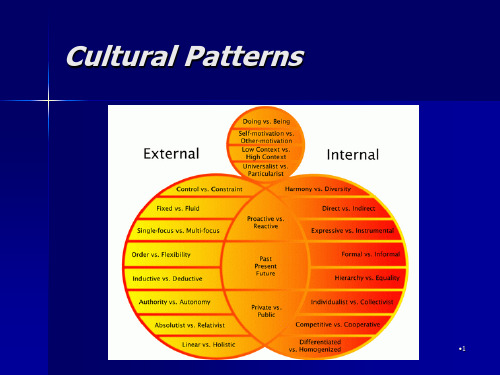英文跨文化交际 ppt课件
合集下载
跨文化交际UNIT-8PPT课件

•9
Reading II
➢ Ethnocentrism is negatively judging aspects of another culture by the standards of one’s own culture. It is the technical name for the view of things in which one’s own group is the center of everything, and all others are scaled and rated with reference to it.
•7
Reading II
Read the article “Ethnocentrism and Ethnorelativism” (p272276) .
1. What is ethnocentrism? ➢ Most other cultures are backward compared with my culture. ➢ My culture should be the role model for other cultures. ➢ Other cultures should try to be more like my culture. ➢ Most people from other cultures just don’t know what’s good or
Indian summer with her second highly acclaimed film this year. 9. Before she left, she said a final goodbye and give him a long French kiss. 10. The companies do not wish to Welsh on their debts to banker if though their business seems to be not good at the moment.
Reading II
➢ Ethnocentrism is negatively judging aspects of another culture by the standards of one’s own culture. It is the technical name for the view of things in which one’s own group is the center of everything, and all others are scaled and rated with reference to it.
•7
Reading II
Read the article “Ethnocentrism and Ethnorelativism” (p272276) .
1. What is ethnocentrism? ➢ Most other cultures are backward compared with my culture. ➢ My culture should be the role model for other cultures. ➢ Other cultures should try to be more like my culture. ➢ Most people from other cultures just don’t know what’s good or
Indian summer with her second highly acclaimed film this year. 9. Before she left, she said a final goodbye and give him a long French kiss. 10. The companies do not wish to Welsh on their debts to banker if though their business seems to be not good at the moment.
跨文化交际PPT演示课件

23
3. Space and Distance
3.1 Proxemics 3.2 Attitudes Toward Crowding
24
3.1 Proxemics
✓ Definition: the study of people’s perception and use of space.
✓ Four categories: intimate, personal, social, and public distance.
26
Categories of Distance (cont’d)
• Social Distance (1.3-3m) - colleagues, business partners, people at social gatherings
• Public Distance (beyond 3m) - speaking in public
- direct intrusion into others’ affairs • Shrugging shoulders
- indifferent, powerless, having no secret to conceal
19
Postures (cont’d)
• Follow one’s natural habits so often go unnoticed (subconscious in nature)
• May damage your image if you neglect your postures
20
2.4 Eye Contact
Direct eye contact • Chinese: avoid • North Americans: appreciate • The British: avoid
3. Space and Distance
3.1 Proxemics 3.2 Attitudes Toward Crowding
24
3.1 Proxemics
✓ Definition: the study of people’s perception and use of space.
✓ Four categories: intimate, personal, social, and public distance.
26
Categories of Distance (cont’d)
• Social Distance (1.3-3m) - colleagues, business partners, people at social gatherings
• Public Distance (beyond 3m) - speaking in public
- direct intrusion into others’ affairs • Shrugging shoulders
- indifferent, powerless, having no secret to conceal
19
Postures (cont’d)
• Follow one’s natural habits so often go unnoticed (subconscious in nature)
• May damage your image if you neglect your postures
20
2.4 Eye Contact
Direct eye contact • Chinese: avoid • North Americans: appreciate • The British: avoid
大学英语跨文化交际案例分析课堂PPT演示样本

Case Three: Cultural Misunderstandings in International Tourism
• Summary: Cultural Misunderstandings in International Tourism
Case Three: Cultural Misunderstandings in International Tourism
• Detailed description • Catering habits: ts from different cultural backgrounds may have
different dining habits and preferences. For example, some cultures may prefer spicy food, while others may place more emphasis on a light and healthy diet. • Etiquette and Customs: During the tourism process, tourists need to understand and abide by local etiquette and customs. For example, in some cultures, touching someone's head or using the left hand is considered impolite and disrespectful behavior. • Language expression: In cross-cultural communication, differences in language expression may lead to misunderstandings and conflicts. For example, some languages may have specific expressions or implicit meanings, which may lead to communication barriers if not understood.
跨文化交际(英文PPT)

the issues concerning intercultural communication .
III. Plan.
1.Required Textbook :Communication Between Cultures (Third Edition)By Larry A. Samovar Richard E. Porter Lisa A. Stefani 2000 2. Time schedule: 36 periods in one term. 1).Introduction to Intercultural Communication ;4periods 2).Part I Communication and Culture; 8 periods 3).Part II The Influence of Culture ; 8 periods 4).Part III From Theory of Practice; 8 periods 5).Part IV Knowledge into Action; 8 periods 3. Evaluation will be based on: 1)Attendance and participation. 2)Project presentation and handout (the required essay ). 3)Final examination.
The book is divided into four interrelated parts, including 10 chapters: (Look at P.F28)
Part I introduces the study of communication and culture(Chapter1-2);
III. Plan.
1.Required Textbook :Communication Between Cultures (Third Edition)By Larry A. Samovar Richard E. Porter Lisa A. Stefani 2000 2. Time schedule: 36 periods in one term. 1).Introduction to Intercultural Communication ;4periods 2).Part I Communication and Culture; 8 periods 3).Part II The Influence of Culture ; 8 periods 4).Part III From Theory of Practice; 8 periods 5).Part IV Knowledge into Action; 8 periods 3. Evaluation will be based on: 1)Attendance and participation. 2)Project presentation and handout (the required essay ). 3)Final examination.
The book is divided into four interrelated parts, including 10 chapters: (Look at P.F28)
Part I introduces the study of communication and culture(Chapter1-2);
跨文化交际(精品课件)

15
A Monumental Figure
• Edward Twitchell Hall, (1914 –2009) , American anthropologist and cross-cultural researcher.
• Hall introduced a number of new concepts, including proxemics, polychronigh and low context cultures.
Cross-cultural communication refers to any communication between two members of any cultural communities. (Samovar and Porter, 2004:47)
11
Cross-cultural Communication Vs
his Linguistic Across Cultures(《跨文化语言学》). He discussed the cultural comparison in three aspects: form, meaning and distribution(顾嘉祖,4). • In 1959,the Silent Language by Edward T. Hall initiated the cross-cultural studies. • R.Oliver , 1962, Culture and communication • A.G.Smith, 1966,Culture and communication • In 1970s, ICA (International Communication Association) accepted Cross-cultural Communication as a branch discipline. as a discipline) • Journals: International and Intercultural Journal of Intercultural Relations.
A Monumental Figure
• Edward Twitchell Hall, (1914 –2009) , American anthropologist and cross-cultural researcher.
• Hall introduced a number of new concepts, including proxemics, polychronigh and low context cultures.
Cross-cultural communication refers to any communication between two members of any cultural communities. (Samovar and Porter, 2004:47)
11
Cross-cultural Communication Vs
his Linguistic Across Cultures(《跨文化语言学》). He discussed the cultural comparison in three aspects: form, meaning and distribution(顾嘉祖,4). • In 1959,the Silent Language by Edward T. Hall initiated the cross-cultural studies. • R.Oliver , 1962, Culture and communication • A.G.Smith, 1966,Culture and communication • In 1970s, ICA (International Communication Association) accepted Cross-cultural Communication as a branch discipline. as a discipline) • Journals: International and Intercultural Journal of Intercultural Relations.
跨文化交际unit6 verbal communication-课件

❖ Language: a system of arbitrarily chosen, conventionalized, vocal, graphic or gesture symbols serving the needs of communication among the members of a gives hovering over rugged old trees wreathed with rotten vine---the day is about done.
❖ 夕阳西下,断肠人在天涯。 ❖ Yonder is a tiny bridge
over a sparkling stream,
❖ 2) overlapping of denotative meaning ❖ In addition to total equivalence of words and absence
equivalence in denoting of certain referents, cultures also overlap in the denotation of certain vocabulary. 3. Cultural differences in connotative meaning 1) words with same denotation but different connotation. a. color words b. animal words c. numbers
❖ ☻ Meanings of words are personal.
❖ ☻ Meanings of words are also culture specific.
2. Cultural differences in denotative meaning:
英文版跨文化交际PPT课件

east&west
12/14/2019
1
1.gift
This is the American way to open gifts, they usually opened directly after dinner received a gift. Directly express their own joy.
wedding vows in the
church.Couples pay worship to be
2019/12/14
10
WOW!!。。。。。
2019/12/14
11
额。。。。。。。
2019/12/14
12
虽然每一种文化都有自己的社会做法。但是每一个 人都是独特的不同的,每个人都可以选择自己喜欢 的做法。
2019/12/14
9
wedding ceremony
• 东西方文化中不同的婚礼以仪式。西方文化中婚礼要在教堂中许下誓 言。在中国要进行夫妻交拜。
• Eastern and Western cultures,
different wedding
ceremony.Western culture in the
But, in China, gifts are never opened in front of giver, and doing so is considered
bad manners. So people had to hide his feelings .
这是社会做法的外在表现的一方面。 This is the the outward manifestations aspect of social practices
12/14/2019
1
1.gift
This is the American way to open gifts, they usually opened directly after dinner received a gift. Directly express their own joy.
wedding vows in the
church.Couples pay worship to be
2019/12/14
10
WOW!!。。。。。
2019/12/14
11
额。。。。。。。
2019/12/14
12
虽然每一种文化都有自己的社会做法。但是每一个 人都是独特的不同的,每个人都可以选择自己喜欢 的做法。
2019/12/14
9
wedding ceremony
• 东西方文化中不同的婚礼以仪式。西方文化中婚礼要在教堂中许下誓 言。在中国要进行夫妻交拜。
• Eastern and Western cultures,
different wedding
ceremony.Western culture in the
But, in China, gifts are never opened in front of giver, and doing so is considered
bad manners. So people had to hide his feelings .
这是社会做法的外在表现的一方面。 This is the the outward manifestations aspect of social practices
跨文化交际英文NonverbalCommunication ppt课件

interested Do not believe
Turn toward the person you are talking to.
Roll your eyes and turn your head away.
I. Understanding Nonverbal Communication
NVC involves all those nonverbal stimuli in a communication setting that are generated by both the source and his / her use of the environment and that have potential message value for the source or receiver. (Samovar, 2000: 149)
Unit 5
Nonverbal Communication (I)
In today’s class, we will…
understand what nonverbal communication is
know the function nonverbal communication serves
“Slow down, relax or wait a second.”
in the US- “You did something bad; shame on you.”
Comparison
Meaning
No, don’t do that.
I don’t know
Gesture in the USA
Gesture in China
Moving the index Moving the hand finger from side to from sigging one’s
Cross-CulturalCommunicationUnit1-4跨文化交际.ppt

CHAPTER 1 - Communication and Culture: The Challenge of The Future
Dominant Culture
Co-Cultures
• It's the one in power -
• They are numerous.
control.
• Distinct and unique
• We learned our culture through mass media
• Culture is transmitted from generation to generation
• Culture is based on symbols
• Culture is subjected to change
• Subjective elements include: values, beliefs, attitudes, orientations, and underlying assumptions prevalent among people in the society.
• Basic functions of Culture: adapt to a particular ecology, and includes the knowledge that people need to have in order to function in their own social environment.
• Culture is integrated
• Culture is adaptive
CHAPTER 1 - Communication and Culture: The Challenge of The Future
Cultural-Patterns跨文化交际的文化模式PPT课件

3.2.1 High-Context
A high context (HC) communication or message is one in which most of the information is already in the person, while very little is in the coded, explicitly transmitted part of the message. In high-context cultures, people are very homogeneous with regard to experiences, information networks, and the like. High-context cultures, because of tradition and history, change very little over time.
3.1.3 Power Distance
The premise of the dimension deals with the extent to which a society accepts that power in relationships, institution, and organizations is distributed unequally. People in high-power-distance countries believe that power and authority are facts of life…Social hierarchy is prevalent and institutionalizes inequality. To people in low-power-distance countries, a hierarchy is an inequality of roles established for convenience.
大学英语跨文化交流完整第一章ppt课件

.
A_____ P_____
.
Can you tell which of the following are above the water and which are below?
What and how people eat How to keep healthy How to raise children How to do business How to use time How to introduce people How to participate in ceremonies Rules for gestures Rules for facial expressions and eye contact Etiquette Work speed What is right or wrong, beautiful or ugly, clean or dirty, good or
.
3. Defining Culture from the Sociological Perspective
According to the social scientists: “Culture is defined as a pattern of learned, group-related perception—including both verbal and nonverbal language attitudes, values, belief system, disbelief systems, and behavior”.
.
DEFINITIONS OF ‘CULTURE’
1. Defining Culture from the Anthropological Perspective
A_____ P_____
.
Can you tell which of the following are above the water and which are below?
What and how people eat How to keep healthy How to raise children How to do business How to use time How to introduce people How to participate in ceremonies Rules for gestures Rules for facial expressions and eye contact Etiquette Work speed What is right or wrong, beautiful or ugly, clean or dirty, good or
.
3. Defining Culture from the Sociological Perspective
According to the social scientists: “Culture is defined as a pattern of learned, group-related perception—including both verbal and nonverbal language attitudes, values, belief system, disbelief systems, and behavior”.
.
DEFINITIONS OF ‘CULTURE’
1. Defining Culture from the Anthropological Perspective
cultural-diversity-跨文化交际PPT课件

▪ Although culture is subject to change, the deep structure of a culture is resistant to change.
▪ The comparison and contrast of different cultures help understand one’s own culture and other cultures, which will ultimately enhance the effect of intercultural communication.
1) Human Nature
Basically Evil
Mixture of Good and Evil
Basically Good
2) Relationship of Man to Nature
Nature controls humans
Man in Harmony With Nature
Man the Master of Nature
(10 mins)
.
17
2. Model by G. Hofstede (1984)
▪ Hofstede’s work was one of the earliest attempts to use extensive statistical data to examine cultural values.
We are alike, We are different
Appreciate similarities, Accept differences
.
2
Warm-up: Read the following sayings aloud,
▪ The comparison and contrast of different cultures help understand one’s own culture and other cultures, which will ultimately enhance the effect of intercultural communication.
1) Human Nature
Basically Evil
Mixture of Good and Evil
Basically Good
2) Relationship of Man to Nature
Nature controls humans
Man in Harmony With Nature
Man the Master of Nature
(10 mins)
.
17
2. Model by G. Hofstede (1984)
▪ Hofstede’s work was one of the earliest attempts to use extensive statistical data to examine cultural values.
We are alike, We are different
Appreciate similarities, Accept differences
.
2
Warm-up: Read the following sayings aloud,
跨文化交际英文版14-Cultural-Differences-in-Business-NegotiationPPT演示课件

packages that would be displayed in plain sight
of Saudi women and children. Consequently, to
satisfy Saudi customs officials, the entire
shipment of men’s briefs had to be sent back to
12 Your site here
2. Negotiating Attitude
Win/Lose
❖Distributive bargain ❖Confrontational process ❖Incompatible goals
Win/Win
❖Integrative bargain ❖Celebrative/problemsolving process ❖Compatible goals
2) What do you think would be a proper way to package the underwear in order to be accepted by Saudi Arabians?
10 Your site here
III. The Top Ten Ways Culture Affects Negotiating Style
4. Conclusion
2 Your site here
I. Defining Intercultural Negotiation
❖Negotiation ❖Intercultural Negotiation
❖ Moran & Stripp (1991)
3 Your site here
跨文化交际英文PPT

like a bee pupa.
02
Yunnan people eat ant eggs
April, around the water-sprinkling festival, is a good season to dig out
ant eggs.
When visiting the dai family of menglian (dai lahu nationality wa
growth state of plants. For example, a piece of grass is very bright, or a certain Chinese herbal medicine suddenly grows out, which are all characteristics of the egg hiding.
牛奶。
7. Not using enough milk.没放够 牛奶
thanks
小组成员:
钭钰婷、陈雪晴、尹琳、俞梓颖
A survey reveals that the average British
person will say 'sorry' more than 1.9
million times in their lifetime.
04
say ‘sorry’
Of course, 'sorry' has a multitude of uses in this country.Interestingly, the
attention to oneselft,these are the
characteristics that linguists often refer to as NEGATIVE POLITENESS(负面礼貌)
- 1、下载文档前请自行甄别文档内容的完整性,平台不提供额外的编辑、内容补充、找答案等附加服务。
- 2、"仅部分预览"的文档,不可在线预览部分如存在完整性等问题,可反馈申请退款(可完整预览的文档不适用该条件!)。
- 3、如文档侵犯您的权益,请联系客服反馈,我们会尽快为您处理(人工客服工作时间:9:00-18:30)。
Susan: Thank you! The same to you.
Husband’s translation: 谢谢妈妈,我祝您身体健康。
Mother: 谢谢,谢谢。
18.04.2020
7
Activity 1 Forms of address
Doctor, Professor, Judge, Preseident, Senator, Governer, Mayor, Colonel, Captain,aware of your own behavior patterns and how they are shaped by Chinese culture.
3. know how to avoid or lessen misunderstanding in intercultural communication and be able to convey your ideas more successfully.
18.04.2020
12
Activity 5 Inviting
Now study the following statements and think how you would respond to each of them. Discuss in small groups.
Let's get together soon. I haven' t seen you for a long time. You must come round for dinner
Chapter 5 Social Interaction
18.04.2020
1
18.04.2020
Role – behavior expected of someone who holds a particular status
Role set – a number of roles attached to a single status
2
By the end of this chapter, you should be able to:
1. have a better understanding of the conventions and expectations of different cultures in areas such as:
18.04.2020
11
Activity 4 Compliments and responses
A. A Canadian woman acquaintance of a Chinese art teacher asked him to look over an article that she had written about Chinese painting. He agreed, but added something politely. What do you think he would like to add?
– If the host just brings the food or drink and ignores our “no”, we will____.
18.04.2020
15
Activity 7 Showing Hospitality in Different Ways
sometime. It's good seeing you. I'll invite you to tea later. I'm going to give a party this weekend. Come if you like. How about joining us for dinner this Friday night?
– We Chinese usually say “no” when somebody offers something,because__________________.
– After we say “no” , we usually __________________________, but that never happens in a foreigner’s home.
– go Dutch – pool one’s money – pick up the tab – buy one’s round
18.04.2020
14
Activity 7 Showing Hospitality in Different Ways
Task 1: Too modest?---When “No” Does not Mean No.
Susan: Yes, oh thanks for your delicious food, I like them very much.
Husband’s translation: 谢谢妈妈给我们做了那么多好
吃的。
Mother: 自家人谢什么,苏珊,你以后可不要再减肥了,
身体健康才最重要哪!
Husband’s translation: It’s my pleasure, Susan, I hope you become even more beautiful.
Chinese culture is relation-oriented. Maintaining or promoting relation calls for something interpersonal, so it is quite acceptable in China to greet each other by asking private questions, while English people have a very strong sense of privacy.
18.04.2020
9
Activity 3
Farewells
“Good-bye” or “Bye-Bye” is acceptable both in English and Chinese, and it is a very formal way. English people also say “See you”, “See you later”, “Good night”, and “Have a nice day”.
任), li yisheng (李医生) , etc. Do Americans have similar
customs?
18.04.2020
5
Case study
A Situation: What to say
E.G. A conversation between Susan and Mrs. Zhang, her mother-in-law, at the airport when leaving China. The husband is interpreting for them.
18.04.2020
6
Susan: Mrs. Zhang, come to New York if you want.
Husband’s translation: 妈妈,您可一定要来纽约看看。 Mother: 不去了,给你们添麻烦。
Husband’s translation: Oh, it depends on the physical condition.
C. We Chinese routinely use many position-linked or
occupation-linked titles to address people, such as wang
jinling (王经理), ma juzhang (马局长), zhang zhuren (张主
Compliments and praises are of great social functions. Concerning compliments and compliment responses, the pragmatic rules are various in different cultures.
18.04.2020
4
Activity 1 Forms of address
A. The young lady Marilyn in America addresses her
mother-in-law by her first name, Ellen. How do you account for this? Could the same thing happen in China? Why?
• Forms of address • Greetings • Farewells • Complimenting and responding • Inviting • Paying for a meal • Showing hospitality • Disagreeing, etc.
18.04.2020
Those expressions convey less personal concerns than Chinese routines such as “Walk slowly”, “Stay longer”.
18.04.2020
10
Activity 4 Compliments and responses
B. In China we address a stranger with an advanced age
"Grandpa" or "Grandma". Why do we do so since that stranger is not connected to us by blood? How does this sound to an English ear?
